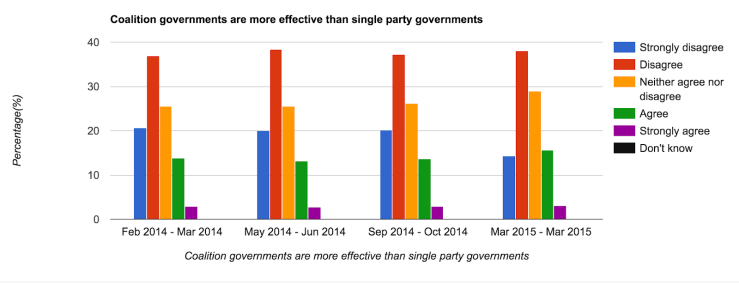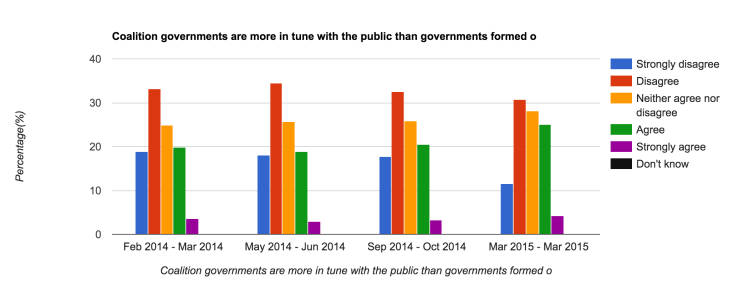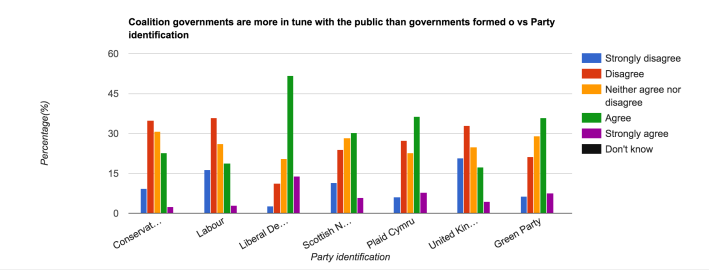The growth of small parties in the United Kingdom has threatened the possibility of a single-party winning the majority vote. Due to political fragmentation and tension between parties rising in the U.K., in the 2010 election, there was not a single-party that held a majority – thus a coalition government had to be formed between the Conservatives and the Liberal Democrats. Seeing as a coalition had not occurred in decades, many people were left confused as to what this meant for the British government looking forward.
The 2014-2015 data gathered below investigates the political attitudes of the public and their opinions on the effectiveness of coalition governments. This panel study examines the same individuals’ attitudes during the 2014-2015 year in an effort to maintain independent variables and to see how their perspectives evolved. According to the British Election Study, while there was no absolute majority, most people disagreed that coalition governments are more effective than single-party governments. To note, a clear trend exists that shows that these attitudes remained consistent throughout the year, and those who disagree outweigh those who agree by over three times.

In support of this data, according to British Social Attitudes 32, after the 2010 election, the favorability of coalition governments fell drastically in popularity. This was a sizable change seeing as the support for single-party governments and coalition governments in the past three decades appeared to be relatively balanced with almost half preferring coalitions. After the election, polls showed over a 15% drop in those who prefer coalitions. Thus, the favorability of coalition governments, following the 2010 election, had reached the lowest it had in 30 years.
In the graph below, political attitudes are gathered regarding coalition governments being more in tune with the public than single-party governments. This data shows that before the March 2015 election, political attitudes changed. In fact, before the approaching election, those who strongly disagree/disagree almost tripled those who strongly agree/agree. However, right before the election, these attitudes changed. Surprisingly, almost 20% of people who strongly disagree/disagree changed their minds to neither, agree or strongly agree. Seeing as these are the same participants polled only a few months apart, what has changed?

One possible explanation for the change is that members of small parties altered their attitude to seize political opportunity. Nearing the election, as the possibility of a coalition government seemed likely, the smaller parties potentially saw an opportunity to gain power.
The U.K. possesses an SMDP electoral system, also known as first-past-the-post. For this system, the U.K. is divided into electoral districts with the party that receives the most votes winning the seat in Parliament. This majoritarian system is restrictive and makes it arduous for small parties to be competitive. Recently the vote share for small parties has shown an increase, yet the number of smaller parties winning are not showing this same trend. Thus, the vote share in Britain is separating from seat share and no longer representing it. As a result of this observation, smaller parties are seeing a rare opportunity to seek more political power by forming coalitions with one of the main two parties. This is likely a result of growing Euroscepticism and Brexit changing the political game. According to Roland Flamini in Too Many Parties: Governing Britain after the election, the vote share in elections is becoming more unpredictable. The United Kingdom Independence Party (UKIP) has threatened both the Conservative and Labour party – who used to receive 95% of the electorate’s votes.
The 2015 data below indicates that the majority of those who identified as Conservative or Labour did not believe that coalition governments were more in tune than single-party governments. This is likely a result of them having the ability to attain a majority, so they do not desire a coalition because it just indicates that they were shy of winning a majority and that they have to share power with a smaller party. This also brings many complications of how to divide responsibilities and positions. While Liberal Democrats showed the opposite, with over twice the number of partisans who agree compared to disagree. The Scottish Nationalist Party, Plaid Cymru, and the Green Party all displayed similar trends in that most partisans agreed, as well. One interesting anomaly in the data is that most members of UKIP deviated from the other smaller parties by showing that they believe that single-party governments are more in tune with the public. One possible explanation for this is that UKIP is known to be traditionalist. According to British Social Attitudes 32, UKIP supporters are mainly in an age group over 55, and have “a deep vein of social conservatism and distrust of government.” The conservative nature and population of older members could be a factor in their lack of favorability toward coalition governments.

The attitudes of the public towards coalition governments has changed considerably over the last decade. The 2010-2015 coalition aimed to reduce a budget deficit that arose from the 2008 financial crisis and according to the former Prime Minister Nick Clegg, aimed to “persuade [the public] to put [their] faith in politics once again.” Like many political promises, this was not kept. The Coalition’s policies on public spending reform became a throbbing source of controversy, that was also at the face of Brexit and the rising of UKIP. The coalition government was ended in 2015 when David Cameron promised that Conservatives would “renegotiate” the EU and Britain relationship.
From this data, I have concluded that favorability towards a single-party or coalition government is likely reliant on the time (whether near an election or coalition government) and the political affiliation of the individual. As smaller parties begin to gain power, this is tough news for the main two parties. Although Brexit seems to be at the forefront of Parliament’s mind, I believe that more focus needs to be on the high disproportionality between the division of vote to seat share. The rise of smaller parties seems to be due to a lack of trust in the bigger political parties, which might not be a good sign. Although the Liberal Democrats did see benefits by forming the coalition, this seemed to have adverse effects as the controversies within their Parliament fell on them in the 2015 election where they had a devastating loss and not on the Conservatives who won. So I leave you with the question, is the rising power of small parties in the U.K. more representative of the population or just create a more inefficient Parliament?

